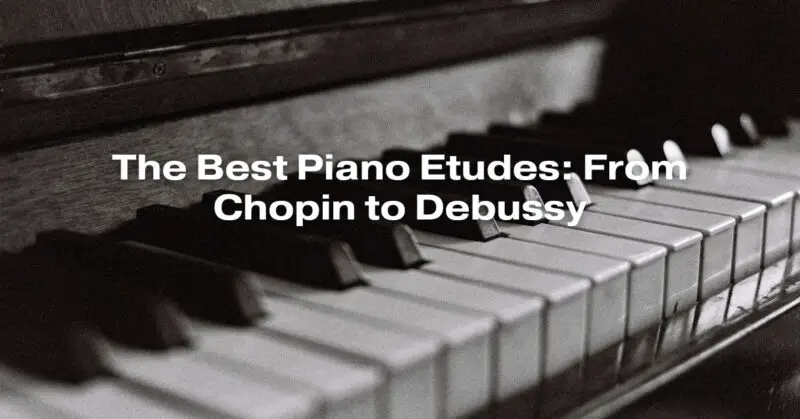Piano etudes, a genre of music designed to develop and showcase technical prowess, have also proven to be profound and emotionally expressive compositions. “The Best Piano Etudes: From Chopin to Debussy” is a journey through the world of these musical gems, highlighting the technical challenges and artistic depth that composers have brought to this genre. Whether you’re a pianist striving for mastery or simply an appreciator of beautiful music, this guide introduces you to the etudes that have left an indelible mark on the piano repertoire.
1. Frédéric Chopin – “Études, Op. 10”
- Étude No. 3 in E major (Tristesse): Begin with the lyrical and melancholic Tristesse, known for its poignant melodies.
- Étude No. 5 in G-flat major (Black Key Étude): Embrace the virtuosic challenge of playing entirely on black keys, creating a sparkling and joyful atmosphere.
- Étude No. 12 in C minor (Revolutionary Étude): Conclude with the dramatic and powerful Revolutionary Étude, filled with fiery passion.
2. Franz Liszt – “Études d’exécution transcendante”
- Étude No. 10 in F minor (Appassionata): Dive into Liszt’s passionate and emotionally charged Appassionata.
- Étude No. 11 in D-flat major (Harmonies du soir): Explore the dreamy and mystical Harmonies du soir, known for its luminous beauty.
- Étude No. 12 in B-flat minor (Chasse-neige): Conclude with the relentless and whirlwind-like Chasse-neige, evoking a snowstorm.
3. Claude Debussy – “12 Études”
- Étude No. 3 in E major (Pour les quartes): Begin with the playful exploration of fourths in Pour les quartes.
- Étude No. 6 in D-flat major (Pour les huit doigts): Embrace the challenge of using only eight fingers in Pour les huit doigts.
- Étude No. 12 in D-sharp minor (Pour les accords): Conclude with the mysterious and harmonically rich Pour les accords.
4. Sergei Rachmaninoff – “Études-tableaux, Op. 39”
- Étude No. 5 in E-flat minor: Delve into the haunting and introspective E-flat minor Étude.
- Étude No. 9 in D major: Explore the lyrical and melodic D major Étude, filled with Rachmaninoff’s signature romanticism.
- Étude No. 12 in C minor: Conclude with the brilliant and thunderous C minor Étude, a showcase of virtuosity.
5. György Ligeti – “Études for Piano”
- Étude No. 1 (Désordre): Begin with the chaotic and frenetic Désordre, a modern exploration of dissonance.
- Étude No. 9 (Vertige): Embrace the dizzying and hypnotic Vertige, a rhythmic and technical challenge.
- Étude No. 13 (L’escalier du diable): Conclude with the devilishly difficult L’escalier du diable, pushing the boundaries of piano technique.
Conclusion
“The Best Piano Etudes: From Chopin to Debussy” invites you to explore the world of piano etudes, where technical challenges meet artistic expression. These masterpieces by Chopin, Liszt, Debussy, Rachmaninoff, and Ligeti span the spectrum from emotional depth to virtuosic brilliance, pushing the boundaries of what the piano can achieve. Whether you’re an aspiring pianist or a lover of great music, these etudes offer a fascinating and rewarding journey through the world of piano mastery.


